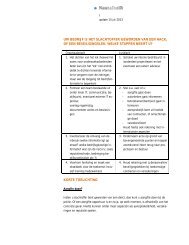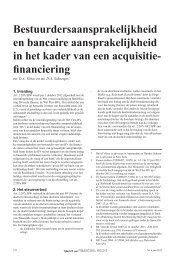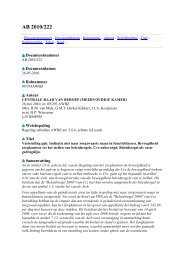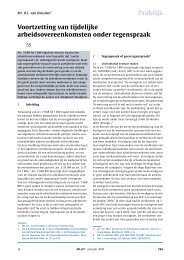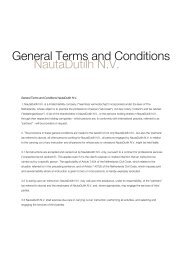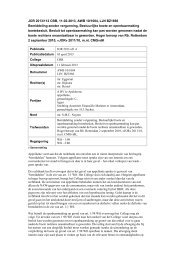Life Sciences Outlook 2012 Dutch biotech companies ... - NautaDutilh
Life Sciences Outlook 2012 Dutch biotech companies ... - NautaDutilh
Life Sciences Outlook 2012 Dutch biotech companies ... - NautaDutilh
You also want an ePaper? Increase the reach of your titles
YUMPU automatically turns print PDFs into web optimized ePapers that Google loves.
A lack of ambition or healthy realism?<br />
The most important reason for <strong>biotech</strong> <strong>companies</strong><br />
to seek an early alliance with Big Pharma is to obtain<br />
(non-dilutive) funding or capital (see Figure 4).<br />
“To think that you can remain independent and<br />
become the next Amgen or Genentech is just not<br />
realistic given the financing requirements for new<br />
drugs and the cost of venture capital. Of all new<br />
<strong>biotech</strong> products that deserve further development,<br />
95% end up in a licensing deal with Big Pharma.”<br />
more as a (temporary) marriage of convenience than<br />
as a prenuptial agreement. In fact, it’s not uncommon<br />
to have alliances with several pharmaceutical<br />
<strong>companies</strong> at the same time. But while a future exit<br />
may not be the main reason to form alliances with<br />
Big Pharma, investors certainly don’t mind. “If you<br />
aim for a takeover by Big Pharma – and VCs certainly<br />
do – you need to appear on their radar screen early.<br />
Before an actual deal is done, they need to be able to<br />
follow you for a couple of years.”<br />
Figure 4. What would be the predominant goals of a <strong>biotech</strong> company<br />
in entering into a strategic alliance?<br />
Obtain (non-dilutive) funding / capital<br />
80<br />
12<br />
Validation of technology / valuation of<br />
the company<br />
Obtain funds, while retaining sufficient<br />
freedom to exit the alliance<br />
Increase the possibility of a complete takeover<br />
14 9<br />
12 9<br />
24 19<br />
Access to new markets through cooperation<br />
with big pharma<br />
10<br />
8<br />
Access the partner's know-how, IP and<br />
development skills<br />
Equity investment by big pharma<br />
10<br />
10 2<br />
20<br />
Access to the distribution capacity of big pharma<br />
6<br />
5<br />
0 20 40 60 80 100<br />
Weighted scores<br />
■ Most important<br />
■ Important<br />
28<br />
The second most important reason is that such an<br />
alliance is seen as a welcome “stamp of approval” for<br />
<strong>biotech</strong> <strong>companies</strong>.<br />
Increasing the possibility of a complete takeover<br />
through such an alliance ranks much lower. This may<br />
reflect the fact that such an alliance is indeed seen<br />
That access to a pharma partner’s know-how,<br />
IP and development skills ranks almost equally low<br />
is, according to some interviewees, a reflection of<br />
several things. Among them is an underestimation by<br />
many <strong>biotech</strong> <strong>companies</strong> of the difficulties involved<br />
in later stages of development (e.g. regulatory<br />
approvals) and clinical acceptance. Perhaps this




